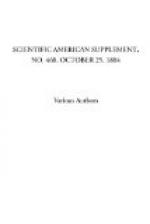[Illustration: CHAMBERLAND’S WATER FILTER.]
With an apparatus like the one here figured, and in which the filtering tube is eight inches in length by about one inch in diameter, about four and a half gallons of water per day may be obtained when the pressure is two atmospheres—the mean pressure in Mr. Pasteur’s laboratory, where my experiments were made. Naturally, the discharge is greater or less according to the pressure. A discharge of three and a half to four and a half gallons of water seems to me to be sufficient for the needs of an ordinary household. For schools, hospitals, barracks, etc., it is easy to obtain the necessary volume of water by associating the tubes in series. The discharge will be multiplied by the number of tubes.
In the country, or in towns that have no water mains, it will be easy to devise an arrangement for giving the necessary pressure. An increase in the porosity of the filtering tube is not to be thought of, as this would allow very small germs to pass. This filter being a perfect one, we must expect to see it soil quickly. Filters that do not get foul are just the ones that do not filter. But with the arrangement that I have adopted the solid matters deposit upon the external surface of the filter, while the inner surface always remains perfectly clean. In order to clean the tube, it is only necessary to take it out and wash it vigorously. As the tube is entirely of porcelain, it may likewise be plunged into boiling water so as to destroy the germs that may have entered the sides or, better yet, it may be heated over a gas burner or in an ordinary oven. In this way all the organic matter will be burned, and the tube will resume its former porosity.—M. Chamberland, La Nature.
* * * * *
SIMPLE DEVICES FOR DISTILLING WATER.
The alchemists dreamed and talked of that universal solvent which they so long and vainly endeavored to discover; still, for all this, not only the alchemist of old, but his more immediate successor, the chemist of to-day, has found no solvent so universal as water. No liquid has nearly so wide a range of dissolving powers, and, taking things all round, no liquid exercises so slight an action upon the bodies dissolved—evaporate the water away, and the dissolved substance is obtained in an unchanged condition; at any rate, this is the general rule.
The function of water in nature is essentially that of a solvent or a medium of circulation; it is not, in any sense, a food, yet without it no food can be assimilated by an animal. Without water the solid materials of the globe would be unable to come together so closely as to interchange their elements; and unless the temperatures were sufficiently high to establish an igneous fluidity, such as undoubtedly exists in the sun, there would be no circulation of matter to speak of, and the earth would be, as it were, locked up or dead.




